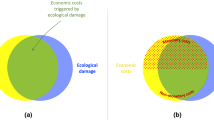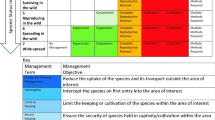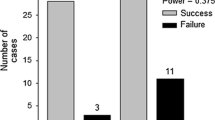Abstract
The problems of controlling exotic species have been acknowledged as serious threats to an indigenous ecosystem as well as to society. In response to these threats, various management programs of exotic species have been proposed for supporting eradication in many regions. Although eradication is regarded as the first-best solution, such attempts have been unsuccessful in reality due to mainly two factors: (1) stock-dependent catchability, and (2) uncertainties. This article demonstrates when to aim at eradication through addressing an optimal adaptive management strategy in the framework of a bio-economic model with the aforementioned factors. The study sets out that the sensitivity of catchability in response to a change in the existing stock determines whether or not aiming at eradication is justified. The results also show that process uncertainty associated with stock growth significantly affects the timing of removal actions for eradication, and an increase in the degree of uncertainty could help achieve eradication in a cost–effective manner if we optimally adapt our removal actions to the uncertainty.






Similar content being viewed by others
References
Bertsekas DP (2001) Dynamic programming and optimal control, vol 1, 3rd edn. Athena, Belmont
Bomford M, O’Brien P (1995) Eradication or control for vertebrate pests. Wildl Soc Bull 23:249–255
Clark CW (1990) Mathematical bioeconomics, 2nd edn. Wiley, New York
Clark CW, Kirkwood GP (1986) On uncertain renewable resource stocks: optimal harvest policies and the value of stock surveys. J Environ Econ Manage 13:235–244
Conrad JM (1999) Resource economics. Cambridge University Press, New York
Dick VA, Hendrichs J, Robinson AS (eds) (2006) Sterile insect technique: principles and practice in area-wide integrated pest management. Springer, Dordrecht
Eisewerth ME, van Kooten G (2002) Uncertainty, economics, and the spread of an invasive plant species. Am J Agric Econ 84(5):1317–1322
Judd KL (1998) Numerical methods in economics. MIT Press, Cambridge
Knight FH (2006) Risk, uncertainty and profit. Dover, Mineola
Kotani K, Kakinaka M, Matsuda H (2008) Optimal escapement levels on renewable resource management under process uncertainty: some implications of convex unit harvest cost. Environ Econ Policy Stud 9:107–118
Kotani K, Kakinaka M, Matsuda H (2009) Dynamic economic analysis on invasive species management: Some policy implications of catchability. Math Biosci 220:1–14
Merton RC (1975) An asymptotic theory of growth under uncertainty. Rev Econ Stud 42(3):375–393
Myers JH, Savoie A, van Randen E (1998) Eradication and pest management. Annu Rev Entomol 43:471–491
Olson LJ, Roy S (2002) The economics of controlling a stochastic biological invasion. Am J Agric Econ 84(5):1311–1316
Perrings C, Williamson M, Dalmazzone S (2000) The economics of biological invasions. Edward Elgar, Cheltenham
Pimentel D, Zuniga R, Morrison D (2005) Update on the environmental and economic costs associated with alien-invasive species in the United States. Ecol Econ 52:273–288
Puterman ML (1994) Markov decision processes, discrete stochastic dynamic programming. Wiley, New York
Reed WJ (1979) Optimal escapement levels in stochastic and deterministic harvesting models. J Environ Econ Manage 6:350–363
Saphores JM, Shogren JF (2005) Managing exotic pests under uncertainty: optimal control actions and bioeconomic investigations. Ecol Econ 52:327–339
Sethi G, Costello C, Fisher A, Hanemann M, Karp L (2005) Fishery management under multiple uncertainty. J Environ Econ Manage 50:300–318
Simberloff D (2002) Today tiritiri matangi, tomorrow the world! Are we aiming too low in invasion control? In: Clout MN, Veitch CR (eds) Turning the tide: the eradication of invasive species. University of Auckland, Auckland, pp 4–12
Walters C (1986) Adaptive management of renewable resources. Blackburn, New Jersey
Acknowledgments
Our gratitude goes to financial support from the Japanese Society for the Promotion of Science through the Grants-in-Aid for JSPS Fellow (No. 1807056) and for Scientific Research C (No. 19530221). We also thank the members of the Global COE Program “Eco-Risk Asia” at Yokohama National University and National Institute for Environmental Studies for valuable comments and encouragement. This work is also supported by a JSPS grant to H. Matsuda. Finally, thanks are due to two anonymous referees of this journal for their comments.
Author information
Authors and Affiliations
Corresponding author
Additional information
An erratum to this article can be found at http://dx.doi.org/10.1007/s10144-010-0231-8
Rights and permissions
About this article
Cite this article
Kotani, K., Kakinaka, M. & Matsuda, H. Adaptive management for eradication of exotic species. Popul Ecol 52, 349–358 (2010). https://doi.org/10.1007/s10144-010-0202-0
Received:
Accepted:
Published:
Issue Date:
DOI: https://doi.org/10.1007/s10144-010-0202-0




